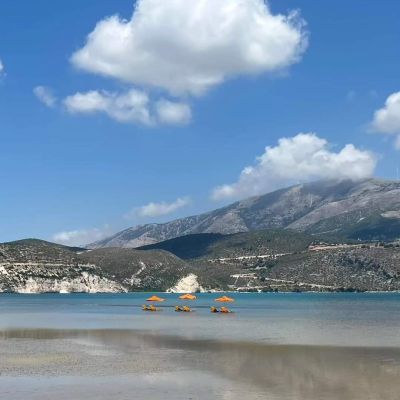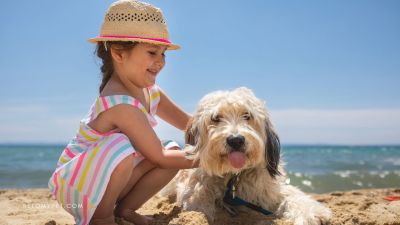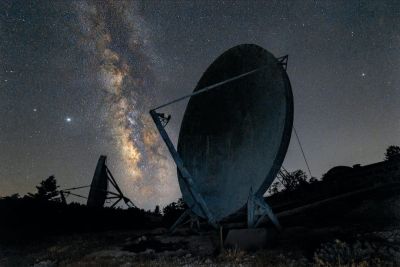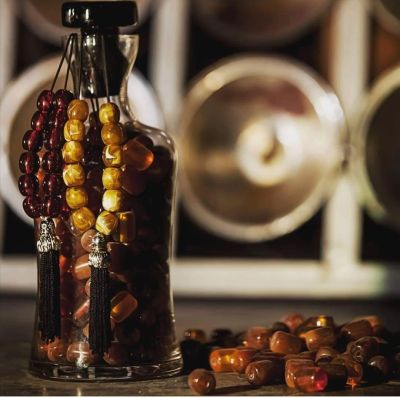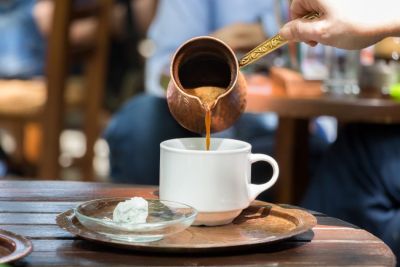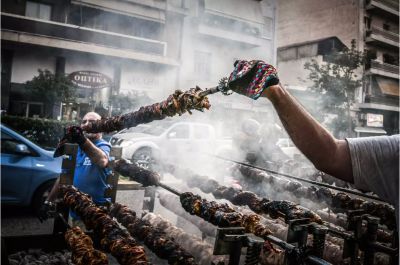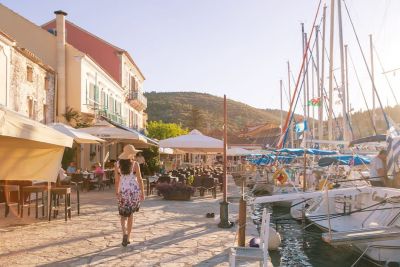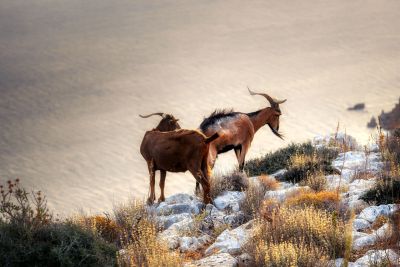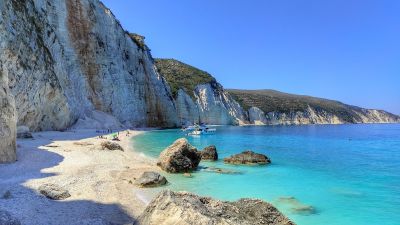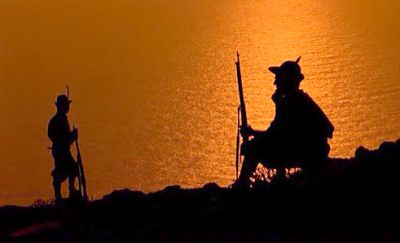PALIKI, A TREASURE TO DISCOVER AT THE END OF THE SUMMER
Kefalonia is among the ten largest islands in Greece and the largest of the Ionian Islands, so large that it has regions with their own landscape and cultural identity. On the western coast is the Paliki peninsula, separated from the main body of the island by a long, narrow bay. Lixouri, the main center of Paliki, can be reached both by ferry from Argostoli and by road with a panoramic route that runs along the inside of the bay revealing the unique beauty of the Livadi plain.
PET-FRIENDLY KEFALONIA, THE FOURLEGGED ISLAND
When we moved to Kefalonia we were pleasantly surprised to realize that traveling with your pet in Greece is not only possible, but very pleasant. Local hospitality has always been reserved to our dog too, who has never been denied a bowl of fresh water at the restaurant, as well as the possibility of walking everywhere undisturbed and enjoying the beach just like us. There are clearly some rules to follow and some precautions to keep in mind, which we tell you about here to prepare your trip with the whole family, with 2 and 4 legs, without worries.
STARGAZING IN KEFALONIA: THE FIRST DARK SKY PARK IN GREECE
I had the privilege of growing up in a quiet mountain village where children in the evening could sit on the street, still warm from the sun, and look at a dark blue sky full of stars. I loved starry nights, even more when I was lucky enough to see a shooting star or fireflies. Today, reading an article on Mount Ainos and its entry in the IDSP (International Dark Site Park) register, I realized that, although I have grown up and I am in a place totally different from the one I was born in, I am still among the lucky few who in Summer can admire incredible starry nights (as well as bats, birds and other wonderful creatures that populate the night) simply by raising their eyes to the sky. Although in many places today it is no longer possible to clearly see the stars and constellations due to light pollution, throughout the world there are parks certified by the NGO International Dark-Sky Association which are committed to conserving and safeguarding the natural darkness of sky and with it to protect the environments and species closely linked to it.
KOMBOLOI AND BEGLERI
Many of you will already be familiar with komboloi (κομπολόι) and in Greece will have seen it flowing, grain after grain, between the fingers of men of all ages in cafés and on the streets. For those who are wondering what we are talking about, the komboloi is a string closed in a circle on which pearls of different materials are strung. It is a pastime, if necessary a rosary, a precursor of modern anti-stress but also and above all a powerful cultural symbol which was and still remains a predominantly male accessory.
HOW DO YOU DRINK GREEK COFFEE? HOT OR COLD, TAKE IT SLOW
You will have noticed it during your travels in Greece: there is no drink more loved and consumed than coffee. Having a coffee here has nothing to do with the fast and mechanical gestures with which we usually bring a cup of espresso to our mouths before hastily continuing with our activities.
CARNIVAL IN KEFALONIA, THE PERFUME OF TSIKNOPEMPTI
If for those who don't speak Greek it can be almost a challenge to pronounce the term Tsiknopempti, for those who don't know at least a little about Greek culture it can be equally difficult to imagine that there is a day entirely dedicated to meat and, even more specifically, to perfume of grilled meat. Not only taverns and takeaways, but also shops, squares and even schools will be filled today with grills, meat, music and festive voices.
WHAT IF LOVE WAS A PLACE?
Maybe it's because February is the month of love, the birds wake us up in the morning singing out loud melodious harmonies and everything seems more beautiful when you live on a paradise island... In short, it's spring, love is in the air and it is difficult to resist it even if you don't have a truly romantic spirit.
THE GOATS WITH GOLDEN TEETH
Blue sea, little churches with waving flags, octopuses lying in the sun... And goats, goats everywhere. Funny and very agile, sacred to the ancients and insatiable devourers of plants and more, goats are among the undisputed symbols of Greece. Do you think this is an exaggeration? Look back at your holiday photos and you will probably agree with us. But did you know that Kefalonian goats have something really special? Like real rappers, their teeth are golden!
SNAPSHOTS FROM KEFALONIA: THE BEST 10 PHOTO STOPS
Before setting foot in Greece for the first time, I imagined the Ionian Islands just like in the novels by Durrell and De Bernières that I loved so much: a small world on the edge of reality, with very hot summer days, immense olive groves and a sea as blue as the sky. I feared that upon arrival in Kefalonia my imaginary world would mercilessly collapse but a quick look out the window upon landing was enough to reassure me. One of the largest Greek islands, Kefalonia has dream beaches, mysterious caves and hidden lakes, picturesque villages, incredible views just waiting to be photographed and maybe shared with friends and family.
MEDITERRANEO, THE STORY OF A STATE OF MIND
For what is probably the hundredth time, tonight we find ourselves watching "MEDITERRANEAN" with a melancholy smile and eyes that can't take off the screen, enraptured by scenes and monologues that we now know by heart. It is a cinematic masterpiece but also something more, a state of mind.

